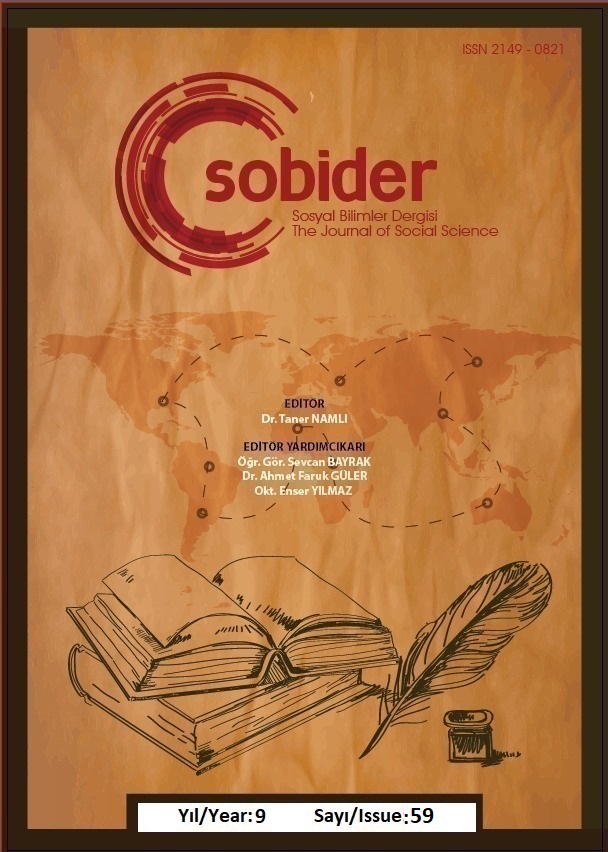Author :
Abstract
Postmodernitenin kapsayıcı bir tanımının verilmesi güç olsa da genel olarak postmodernite, modernitenin dayandığı temellere felsefi bir karşı çıkış olarak okunabilir. Modernitenin akılsallığa yaptığı aşırı vurgu, postmodern görüşün en önemli eleştirilerinden birisini oluşturmuştur. Aydınlanmacı idealler kapsamınca sıkı sıkıya bağlanılan ve yüceltilen usçuluk düşüncesinin yol açtığı modernite krizinin, postmodern düşünce içerisinden çözülebileceğine inanan postmodern düşünürler, bir bakıma modernite ideallerini terk etmiştir. Bununla birlikte modernitenin evrenselci idealleri ve bu ideallerin yol açtığı sıkıntılar da postmodern düşünürlerce eleştirilmiştir. Nietzsche Aydınlanma ideallerini ciddi bir biçimde eleştirerek, postmodern düşünceye kaynaklık etmede oldukça önemli bir figürdür. Onun görüşleri kendisinden sonra gelen birçok önemli düşünürü etkileyerek, Batı felsefesi içinde kendisine yer bulacak postmodernite akımına yol açmıştır. Bu bağlamda, moderniteyi henüz bitmemiş bir proje olarak tanımlayan ve moderniteden neden vazgeçemeyeceğimizi gerekçelendiren Jürgen Habermas’ın görüşleri ise oldukça detaylıdır. Habermas, modernite- postmodernite geriliminde, modernliğin safında yer alarak, Modernliğin Felsefi Söylemi adlı eserini tümüyle bu düşüncesine adamıştır. Habermas bu bağlamda, postmodern düşüncenin beslendiği en önemli kaynak olarak gördüğü Nietzsche felsefesi ile hesaplaşmıştır. Habermas, Nietzsche eleştirisi ile postmodernitenin açmazlarını göstermenin yanı sıra, modernlik projesinin yenilenmiş versiyonunu sunmaya çalışmıştır. Habermas’ın bu anlamdaki çalışması modernitenin barındırdığı problemlere yine modernite içerisinden yanıt verilebileceğini göstermek ve postmodernitenin sahip olduğu sorunsallar sebebiyle modernite krizine yanıt verebilecek bir araç olmadığını göstermektir. Bu çalışmada Habermas’ın Nietzsche’ye yönelik eleştirilerinin modernite ve postmodernite bağlamında değerlendirilmesi amaçlanmıştır.
Keywords
Abstract
Despite the difficulty of giving a comprehensive definition of postmodernity, in the general sense, postmodernity can be read as a philosophical opposition to the foundations of modernity. Modernity overemphasized rationality, and it has caused one of the most important criticisms of the postmodern view Postmodern thinkers, who believed that the crisis of modernity caused by rationalism, which was firmly adhered to and glorified within the scope of Enlightenment ideals, could be resolved through postmodern thought, in a way abandoned the ideals of modernity. In addition to this, the universalist ideals of modernity have also been criticized by postmodern thinkers. Nietzsche is a very important figure in the source of postmodern thought by seriously criticizing the ideals of the Enlightenment. His views influenced many important thinkers who came after him and led to the postmodernity movement that would find its place in Western philosophy. In this context, the views of Jürgen Habermas, who defines modernity as an unfinished project and justifies why we cannot give up on modernity, are quite detailed. Habermas took the side of modernity in the tension of modernity-postmodernity, devoted his work, Philosophical Discourse of Modernity, to this idea. In this context, Habermas critiqued the philosophy of Nietzsche, which is the most important source that feeds postmodern thought. Habermas tried to present a revised version of the modernity project, as well as showing the deadlocks of postmodernity with his critique of Nietzsche. Habermas’s work in this sense is to show that the problems of modernity can be answered from within modernity and to show that postmodernity is not a tool that can respond to the crisis of modernity due to its problematics. In this study, it is aimed to evaluate Habermas’s criticisms of Nietzsche in the context of modernity and postmodernity.
Keywords
- Biebricher, T. (2015). Habermas, Foucault and Nietzsche: A Double Misunderstanding. Foucault Studies, 1(3), 1-26.
- Craib, I. (1984). Modern Social Theory From Parsons to Habermas. Worcester: Wheatsheaf Books.
- Dallymar, F. (1997). The Discourse of Modernity: Hegel, Nietzsche, Heidegger and Habermas. D'Entrèves, M. P., & Benhabib: (Ed.). Habermas and the unfinished project of modernity: Critical essays on The philosophical discourse of modernity. (ss. 59-97). Cambridge, MA: MIT Press.
- Deleuze, G. (1995). Kant’ın Eleştirel Felsefesi. Taylan Altuğ (Çev.). İstanbul: Payel Yayınları.
- Habermas, J. (1987). The Discourse of Modernity. Massachusetts: MIT Press.
- Habermas, J., & Ben-Habib S. (1981). Modernity versus Postmodernity. New German Critiques. 22(1), 3-14.
- Lioscomb, M. (2002). The Theory of Communicative Action and the Aesthetic Moment: Jürgen Habermas and the (neo)Nietzschean Challenge. New German Critique. 86(2). 135-158.
- Nietzsche, F. (1986). Tarihin Yaşam İçin Yararı ve Zararı Üzerine. Nejat Bozkurt (Çev.). İstanbul: Say Yayınları.
- Nietzsche, F. (2000). Tregadya’nın Doğuşu. İsmet Zeki Eyüboğlu (Çev.). İstanbul: Say Yayınları.
- Taylor, C. (2011). Modernliğin Sıkıntıları. Uğur Canbilen. (Çev.). İstanbul: Ayrıntı Yayınları.





